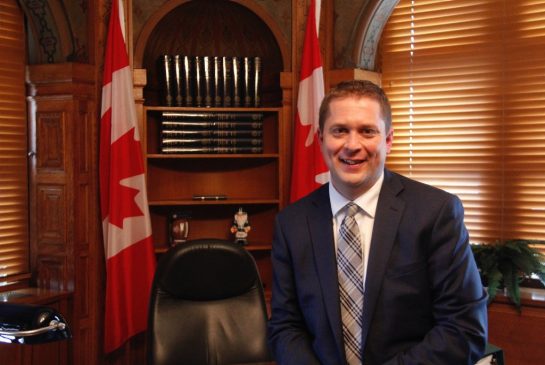In the (perhaps unlikely) event that any students followed the recent Conservative Party federal leadership race, they would surely have noticed one of the more unconventional promises made by Andrew Scheer, the man who now leads the Conservative caucus. During his bid for the party's leadership, Scheer vowed that if made Prime Minister he would cut federal funding to universities that don't protect free speech.
Scheer is currently far behind Justin Trudeau in approval ratings today (and in pairs of fancy socks, if anyone’s counting). But, he does have a chance of becoming Prime Minister in 2019, so it's well worth considering how students and universities would fare under a Scheer administration.
Scheer may be justified in his concern for free speech on university campuses. But far from improving the situation, his proposed solution risks making the climate on many campuses even worse.
Discussion surrounding the topic of free speech on university campuses has gained new momentum in recent months, thanks largely to high profile incidents in the United States at schools such as Middlebury College and UC Berkeley, where protesters forcefully disrupted scheduled talks by right-wing speakers. Similar incidents have happened here at McGill–the interruption of former Premier Jean Charest's talk last year was a textbook case of what's come to be known as the “heckler's veto.” As these types of stories become more frequent in both the US and Canada, many have begun to worry that universities are no longer open places where a variety of views can be expressed and debated freely.
“There is a small group of students on various campuses who shut down debate, who shut down expressions of speech,” Scheer claimed of current attitudes towards free expression on Canadian campuses in an interview with Metro News. “That can’t be allowed to continue.”
Although he has mentioned that he would be open to “working with universities” on a solution, in his acceptance speech Sheer reiterated his threat to withhold federal research grants from institutions that allegedly shut down campus debate.
The fundamental problem with Scheer's proposal isn't that he wants campuses to remain open to free debate—it's how he wants to go about it. Dictating university policy from the federal level would create more problems than it would solve.
Scheer’s solution risks turning the rights of students into a partisan political issue. Judging by the way Scheer invoked his promise during the leadership race, it's possible he would use his proposal during the federal election campaign to rile up those conservative voters who see today's universities as pandering to overly-sensitive liberals. And if he rides such a populist conservative wave to victory in 2019, the temptation to throw some red meat to his base by playing tough with a few of the country's more liberal universities would be undeniable.
Scheer's own motives aside, the effect this promise could have on university administrators is dangerous, too. If universities sense a potential threat to their federal funding, they may take an overly restrictive line with student protesters in order to stay in Scheer's good books. If so, in practice Scheer's proposal could end up infringing on the very freedom it means to protect.
In a recent article in The Atlantic, Thomas Healy remarks that, rather than being attacks on the speech of others, most student protests can be considered expressions of “counter-speech”—a form of pushback that makes a valuable contribution to an open conversation. If a Scheer government—or a university administration acting in fear of one—is overzealous in cracking down on dissent, it would find itself in the counter-intuitive position of limiting free speech for the sake of…free speech.
Scheer isn't the first politician to take issue with the way some students approach debates on campus. On the opposite end of the political spectrum, former US President Barack Obama expressed a similar view back in 2015.
If political leaders are genuinely interested in protecting freedom of speech at universities, there may be room for their involvement. But they should approach universities and students as partners and encourage them to come up with and implement their own solutions, rather than dictating their approach from the top down. Threatening university funding is no way to open the conversation on the state of campus free speech, and will end up doing more harm than good.









